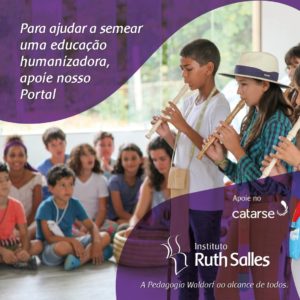The human psychic abilities
One of the worst mistakes is to believe that pedagogy is the science of the child, and not of the human being. Janusz Korczak
All the attitudes we take in our daily lives, throughout our lives, go through three stages: Thinking, Feeling and Wanting/Act. With every decision that life imposes on us, from the simplest, like going to the movies or not, to the most serious, like committing a crime or not, we think logically about the fact, we evaluate the sensations it causes in us, such as: enthusiasm , discouragement, discomfort, determination, fear, anger, affection, shame, etc. After this emotional filter, we decide what action to take about the fact.
The art of educating must provide the human being with a complete and balanced development, including Thinking, Feeling and Wanting, so that he can have a clear thought, a feeling capable of establishing relationships in a healthy way, and so that he can accomplish things good in the world. According to Marta Veiga “these three capacities must be interconnected, integrated, and always talking and harmoniously establishing themselves.”(1)
Each of these soul abilities, looked at separately, has characteristics that are preponderant to it:
• Thinking (cognition, intellect, memory) is mainly related to the neurosensory system, and takes place in a state of consciousness that we can call full wakefulness. From a temporal point of view, it relates more to the past, where what already exists as knowledge resides.
• Feeling (sensations, emotions, sensitive life) is situated between Thinking and Wanting. It relates to the rhythmic respiratory and circulatory systems, and takes place in a state of semi-consciousness, or dream-consciousness. We know that our emotions have a direct effect on our breathing rate, our heart rate, and even our blood pressure. From a temporal point of view, it is more related to the present, representing the emotional reflection of what happens at each lived moment.
• The Will (acting, will, volitional action) is related to the metabolic and motor systems, and takes place in a state of unconsciousness, or dormant wakefulness. This is because we are not aware of the functioning of our metabolism and our movements, which are necessary to carry out our actions. From a temporal point of view, it relates to the future, what we want to accomplish.
Table 2 - The human being's psychic capacities
| Human Abilities | Think / cognition / intellect / memory | To sense / sensations / sensitive life | Want / will / act / volitional action |
overriding characteristics
| related system and concentration point |
neurosensory – head | respiratory rhythm and circulatory - chest |
metabolic and motor abdomen and limbs |
| in what state of consciousness takes place |
mindfulness / awareness | dream wake / semi-consciousness |
sleeping wake / unconsciousness |
| temporal relationship | stronger with the past | stronger with the present | stronger with the future |
Source: Lanz (1990, p. 28) – Our organization
These three soul capacities develop and relate differently to each period of life. A small child, for example, has a very strong Want and is closely linked to Feeling. When she gets agitated asking for something, it's because her every move is linked to her will. The opposite happens with the elderly, Wanting became independent of Feeling, which became more connected to Thinking.
“It is pertinent to human life that a path of human soul capacities is followed as the child's full-feeling will evolves into the elderly's full-feeling thinking. Between the two is human life, and we will only educate well for this human life if we can psychologically focus on this fact [...] its subsequent connection with cognitive thinking. This then concerns the mature age. We will only prepare the child correctly for the later age by making the feeling able to calmly detach itself from wanting; then later on, as a man or woman, she will be able to link feeling liberated with cognitive thinking, becoming an adult for life.”.(2) Rudolf Steiner
Table 3 - The opposite poles in the nature of the human being
| Nature | body | soul | sensitive mental |
| Kid | restless and unconsciously active |
close connection between Feeling and Wanting |
volitional character |
| Elderly | Quiet and contemplative | close connection between Feeling and Thinking |
more rational character and intellectual |
Source: Steiner (2007a, pg. 88) – Our organization
Developing soul skills - examples
Thinking is basically educated by exercising logical reasoning (mathematics, algebra, geometry, etc.), experiencing scientific experiments (biology, astrology, botany, etc.), studying history, interpreting texts, etc. Recent studies, as we will see later, also prove that playing a musical instrument has a strong impact on cognitive development.
Feeling develops through emotional experiences. These can be provided by the experience of human relationships, by telling stories (fairy tales, legends, fables, myths, biographies, etc.), and by interpreting songs, songs, poems, dance, theater, etc. In the theater, playing characters, heroes, villains, sages, adventurers, idealists, petty, nobles, commoners, gods, etc., children and adolescents experience courage and fear, solidarity and avarice, joy and sadness, humor and bitterness, loyalty and betrayal. , love and hate, etc., and this playful experience teaches you to appreciate what is good and reject what is bad, thus helping to strengthen your character.
Wanting, the ability to act, decide and act, is developed through activities that require creating or carrying out something absolutely individual. For this, activities that require a transforming manual action are indicated, such as creating a text, a drawing, a sculpture, a work in wood, etc. In order to develop the will, exerting a positive influence on the child's sentimental nature, we must also encourage the repetition of actions, day after day.
As we have seen, from the point of view of Waldorf Pedagogy, artistic activities, much more than simple pleasure or entertainment, are essential for the balanced formation of the human being, and they need to happen during childhood and adolescence, in the period of elementary school. The educator needs to know how human soul capacities develop throughout life – thinking, feeling and wanting – and knowing when and how to stimulate their development in each child.
Bibliography
- VEIGA, Marta A. Class of the Dom da Palavra project (video recorded). 2008
- STEINER, Rudolph. The Art of Education I. 2007, p. 88.
***


